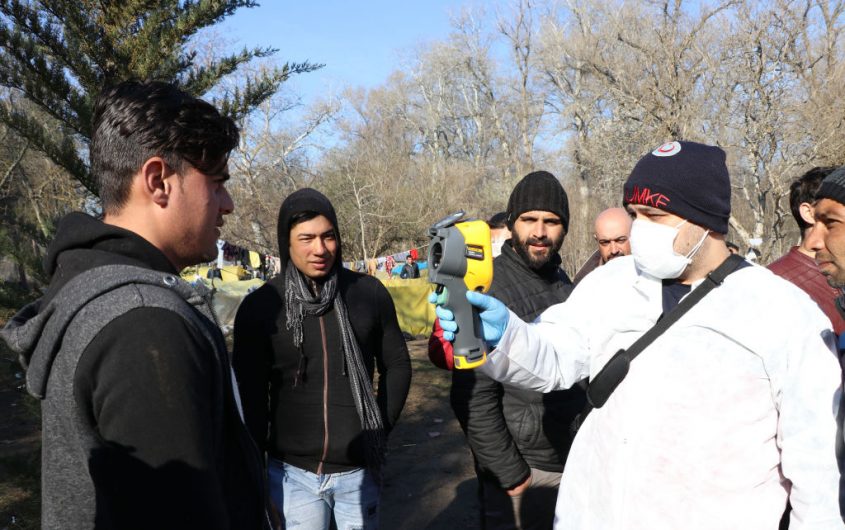
Cihan Demirci/Anadolu Agency via Getty Images
Europe Is Careening toward a Crisis of Its Own Making: Immigration, Coronavirus, and the End of European Values

Elizabeth Hotary
Communications Officer
Elizabeth Hotary is the Communications Officer at AICGS. She creates and implements communications strategies, coordinates publishing activities, and manages media relations. She contributes to AICGS research on workforce education and immigration and integration and has co-led AICGS study tours across the United States and Germany. Before joining AICGS, she taught English at a secondary school in Herne, Germany, as part of the Fulbright Program. During her time as a Fulbrighter, she also volunteered with the U.S. Consulate Düsseldorf’s MeetUS program, where she traveled to schools across North Rhine Westphalia to speak with secondary school students about the United States. She has previous experience at the University of Denver's Josef Korbel School’s Office of the Dean and WorldDenver, a nonprofit global affairs organization.
Ms. Hotary received her MA from the Josef Korbel School of International Studies at the University of Denver, where she was a Marc Nathanson Fellow. She graduated magna cum laude from the University of Arkansas with degrees in International Relations, European Studies, and German. She is an alumna of the Aspen Seminar for Young European Leaders "Next-Gen Europe: Leading for Values."
__
On February 14, France announced the first coronavirus death in Europe. By the end of the month, cases had spread throughout Europe and spiked in Italy. On March 9, Italian prime minister Giuseppe Conte mandated the entire country go on lockdown. As governments dealt with a health crisis, a different crisis was forming at the Turkey-EU border. On Saturday, February 29, Turkish president Recep Tayyip Erdogan announced that Turkey would no longer stop asylum seekers leaving Turkey for the European Union—as agreed in a 2016 migration deal between Turkey and the EU—and in some cases the authorities even provided buses to transport asylum seekers to the border. Clashes between refugees and European border police occurred as a result. On a continent where leaders are even less willing than in 2015 to pay the political price for accepting more refugees, Europe is not prepared for the new humanitarian crisis at its border.
More on the Coronavirus
The Plans to Make A Plan
When over one million people came to Europe in 2015 seeking asylum, Europe was divided on how to manage asylum applications and support services. Germany opened its doors, with Angela Merkel declaring “wir schaffen das.” Despite overloaded administrative systems and shortages of suitable housing, Germany’s bureaucracy worked overtime to process applications and find solutions. Other countries were less welcoming. Hungary set up barbed wire along its southern border and many countries instituted border checks within the Schengen zone. When the EU suggested a quota system to redistribute vulnerable asylum seekers from Italy and Greece to the rest of the member states, the measures were opposed and even challenged in court by central European countries. The European Union met to develop an agenda on migration, which included a multi-faceted approach that covered securing external borders, developing diplomacy and initiatives that would reduce root causes of displacement, and developing a common asylum policy for the whole of the EU.
While EU member states could not agree on common internal policies, member states did agree that external borders should be secured. The 2016 deal between the European Union and Turkey, in which Turkey would host refugees in exchange for monetary support from the EU, was successful in that the number of asylum seekers arriving in Europe dropped significantly from 2016 through 2019. However, at the time of and since the implementation of the deal, critics claimed that the deal was inhumane, not to mention that it put Europe at the mercy of the political whims of President Erdogan.
Four years after their first talks on the migration agenda, Europe is still no closer to a common asylum policy, despite repeated talks about an internal policy.
Four years after their first talks on the migration agenda, Europe is still no closer to a common asylum policy, despite repeated talks about an internal policy. Communiques from late 2019 still expressed the need for a common approach and consensus among member states on a comprehensive migration policy “based on a balance of responsibility and solidarity.” Now, tens of thousands of people are knocking on Europe’s door, and the European Union’s only plan is to keep the door locked.
The Persistence of Populism
A political consequence of Germany’s decision to accept asylum seekers, at first, seemed to be clout and respect among the international community. However, the domestic political situation deteriorated, as previously unsuccessful right-wing populist political parties began to cultivate and capitalize on fear of and opposition to Germany’s welcoming policies. Suddenly, Angela Merkel’s “we can do it” sounded more like a death knell for centrist parties. Centrists who championed humanitarian values in 2015 are now silent, afraid of further electoral losses, as populist parties throughout Europe are either in government or form the largest opposition parties, achieving their greatest electoral success after campaigning on anti-immigration and anti-refugee platforms.
Now that the coronavirus has spread throughout the European Union, populists are using the pandemic to advocate both for the closing of Europe’s open borders and for suspension of asylum programs.
Now that the coronavirus has spread throughout the European Union, populists are using the pandemic to advocate both for the closing of Europe’s open borders and for suspension of asylum programs. Hungary announced on March 1 that it would suspend admission of asylum seekers on the basis of a unsubstantiated claim that there was a connection between the coronavirus and illegal migration. Multiple members of France’s far-right National Rally (formerly National Front) party have called for closed borders, saying that the free movement of goods and people are causes of the pandemic. While EU leaders have ruled out closing borders within the Schengen zone in the face of coronavirus, dismissing calls to reinstate the bloc’s internal borders as political posturing, some countries are making their own decisions. Germany, for instance, decided on March 15 to temporarily shut borders with some of its neighbors.
Crises Collide
The European Union must now manage growing cases of COVID-19 and the humanitarian emergency in Turkey and Greece resulting from the Syrian civil war and its own inaction on common asylum solutions. The European Union was slow to act after Greece illegally suspended processing asylum cases and The New York Times reported illegal black sites detaining and beating migrants. European Commission president Ursula von der Leyen, who had visited the Greek-Turkish border region on March 3, postponed another trip to Athens to instead focus on the COVID-19 situation in Europe. On March 10, President Erdogan returned from a meeting in Brussels insisting that he would not alter his stance. On March 17, he met with Angela Merkel, Emmanuel Macron, and Boris Johnson via videoconference—the in-person summit was cancelled due to coronavirus concerns. The leaders discussed re-negotiating a refugee deal similar to the one recently broken by Turkey; they also discussed how to manage the coronavirus epidemic, especially if it spreads to refugee camps.
Germany has announced that the country is willing to resettle between 1,000 and 1,500 at-risk children currently stuck in Greek camps and called on other European countries to do the same (according to UNICEF, there were 3,868 unaccompanied asylum seeking children in Greece as of June 2019). However, this announcement comes after a similar, ultimately rejected, proposal made at the end of 2019 after some German leaders visited and saw the conditions of refugees on Greek islands. Many factors remain to be seen: if Germany will indeed resettle the children; if others will follow suit; if, pandemic or not, the EU will look to other measures to solve the crisis at the border or simply try to update the deal with Turkey. Whatever the case, human displacement will not cease after the world recovers from the coronavirus pandemic. If Europe continues to postpone a cohesive solution to humanitarian needs around the world, it will face yet another migration crisis at its door.









